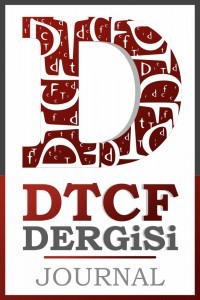Polonyalı Yazar Stefan Żeromski’nin "Erken Bahar" Başlıklı Romanı Üzerine Bir İnceleme
Polonya, Stanisław Żeromski, Erken Bahar, Polonya Edebiyatı, Politika
Analysis on Polish Writer Stefan Żeromski’s Novel “Early Spring”
Polonya, Stanisław Żeromski, Early Spring, Polish Literature, Politics,
___
- BRUDNICKI, Jan Z. (1990). Stefan Żeromski, Przedwiośnie. Warszawa: Jota .
- GARLICKI, Andrzej. (1998). Historia 1815-1939, Polska i Swiat. Warszawa: Scholar.
- HUTNIKIEWICZ, Artur. (1960). Stefan Żeromski. Warszawa: Wiedza Powszechna.
- KRZYZANOWSKI, Julian. (). Dzieje Literatury Polskiej. Warszawa: PWN.
- KURAT, Akdes Nimet. (1999). Rusya Tarihi. Ankara: Türk Tarih Kurumu.
- Maciąg Włodzimierz. (1997). Przedwiośnie Stefana Żeromskiego. Kraków: Lektury Polonistyczne, Dwudziestolecie Międzywojenne II Wojna Swiatowa, Tom Pierwszy, Uniwersitas.
- MICKIEWICZ, Adam. (1986). Pan Tadeusz. Warszawa: Książka i Wiedza.
- MIŁOSZ, Czesław. (1994). Historia Literatury Polskiej. Kraków. Znak.
- NOWACKA, Teresa. (2000). Dwudziestolecie Międzywojenne. Warszawa.
- RADZIWIŁŁ, Anna, Roszkowski, Wojciech. (1994). Historia 1871-1945. Warszawa; PWN.
- YÜCE, Neşe. (2002). Polonya Edebiyatında Aydınlanma-Romantizm- Realizm. Ankara: Kültür Bakanlığı.
- ŻEROMSKI, Stefan. (1982). Przedwiośnie. Wrocław: Biblioteka Narodowa (1978). Słownik Języka Polskiego. Warszawa: PWN
- Yayın Aralığı: Yılda 2 Sayı
- Başlangıç: 1942
- Yayıncı: Ankara Üniversitesi
Baranyai Decsi János’un "Türk İmparatorlarının Kroniği" İsimli Manzum Tarihi
Polonyalı Yazar Stefan Żeromski’nin "Erken Bahar" Başlıklı Romanı Üzerine Bir İnceleme
MACAR DİLİNDE EDİMBİLİM ARAŞTIRMALARI VE YABANCI DİL OLARAK MACARCA ÖĞRETİMİNDE ÖNEMİ
FANTASTİK EDEBİYATA GENEL BİR BAKIŞ - STEFANO BENNI VE STRANALANDIA
Küresel Isınma, Nedenleri ve Sonuçları
Yaratıcı Yazarlık ve Günümüz Türk Öyküsü
Michel Butor’un "Dereceler" Adlı Romanında Anlatımsal Yapı ve Anlatım Yöntemleri
